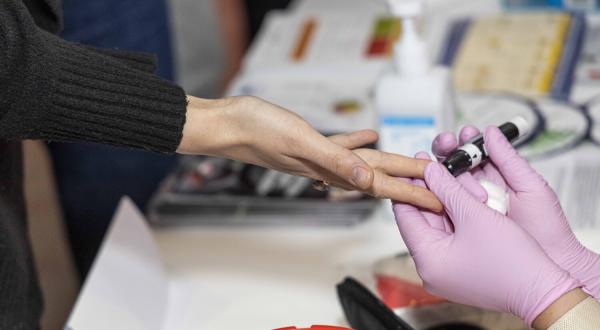RSU International Student Conference Will be Held Online For the First Time
The Rīga Stradiņš University (RSU) International Student Conference, Health and Social Sciences, is a long-awaited event. It will go ahead on 27 and 28 March despite the coronavirus and the declaration of a state of emergency in Latvia. Marija Luīze Kalniņa, the Project Manager of the conference, talks about how the conference will be organised this year and how the organisers are doing.

The organising committee of the RSU International Student Conference Health and Social Sciences. Photo from RSU Student Union archives.
What impact has the emergency had on organising the International Student Conference?
When it became clear that we would not be able to organise the conference on site, we had to consider several other options. Initially, we wanted to organise the conference on a smaller scale by hosting only the jury and the active participants, and still offer all of our workshops and additional events (including court simulations, hackathons and masterclasses). We quickly realised, however, that this situation would pose a risk as well, so eventually we decided to hold the entire conference online.
After meeting with the university's IT specialists we understood that we would be able to realise all conference sections live on Zoom.
Active participants will have the opportunity to present their oral or poster presentations, local and international juries will have the opportunity to ask questions and comment and listeners will be able to watch sessions. The conference will be held in English.
In addition to the conference sections, the opening ceremony on 27 March will be broadcast live from 9:00-10:40. Two speakers will participate in the opening ceremony: Professor Andis Graduiņš from Monash University in Australia will deliver the lecture 'Paracetamol poisoning - risk assessment and treatment', followed by Una Bērziņa-Čerenkova, Head of the RSU China Studies Centre, will deliver the lecture 'In Sickness and in Health: what has COVID-19 taught us about China and the World'.
There will also be two plenary sessions moderated by Artūrs Bernovskis:
27 March, 14:30-16:00 - 'The Robot Doctor Will See You Now: Healthcare in the Technological Era'. The session will be attended by Renāte Strazdiņa, the Director of Microsoft in Latvia, Kaspars Gross, Client Relations Specialist at Datamed, and Professor Andis Graudiņš, Monash University, and Reinis Balmaks, RSU lecturer and Intensive Care Specialist at the Children's Clinical University Hospital.
- 28 March, 14:00-15:30 - 'The 5G Epidemic: Self-Driving Ideas and High-Speed Misinformation'. The session will be attended by Alexander Ļevinskis, Researcher at the Institute of Electronics and Computer Science, Assoc. Prof. Ivars Vanadziņš, Head of the RSU Institute for Occupational Safety and Environmental Health, Mareks Matisons, journalist and host of the TV show Tīkla Vīzija, and Prof. Ivars Austers, Head of the Department of Psychology, University of Latvia.
21 oral presentations and nine poster sections will be presented at the conference. A total of 430 applications have been submitted by students from 17 countries, of which 350 have been approved. 140 jury members in health sciences and 15 in social sciences will join the conference online.
What have been the greatest challenges so far?
I would say that we have already overcome our greatest challenge, which was to reorganise the conference. As soon as we found out that it would be impossible to hold the conference on site it seemed like the eight months of work we had put in went down the drain. Now I can say, however, that we will be able to implement everything we had originally planned in full, albeit in a different format.
I must admit that managing an online conference is as challenging as organising it on-site. We spent the entire last week testing the Zoom platform in order to feel confident managing the different conference sections and to be able to assist any participant or jury member with their questions. This week we will run a simulation. We hope that everything runs smoothly during the conference.
What is the mood in the organising committee?
Though initially we were sad about changing the event's format, the organising team now sees taking the conference online as a new challenge.
Many large-scale student conferences throughout Europe are being cancelled, but we are trying to keep up with the times and not let ourselves and our students down.
We will be able to breathe freely again after the conference. As soon as the self distancing measures are over we are thinking of organising an on-site closing event to mark the event's 70th anniversary – a celebration featuring an awards ceremony and a cake.
The conference's organising committee
International Student Conference website
Related news
 RSU Health Day attracts many first-time donors and large number of student research groupsFor RSU Employees, For Students
RSU Health Day attracts many first-time donors and large number of student research groupsFor RSU Employees, For Students


